Unit 12 翻译中视角的转移
- 格式:doc
- 大小:41.50 KB
- 文档页数:3
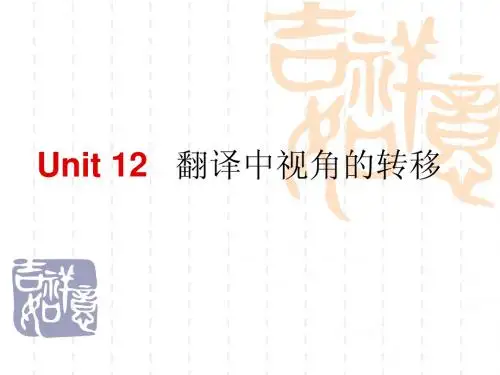
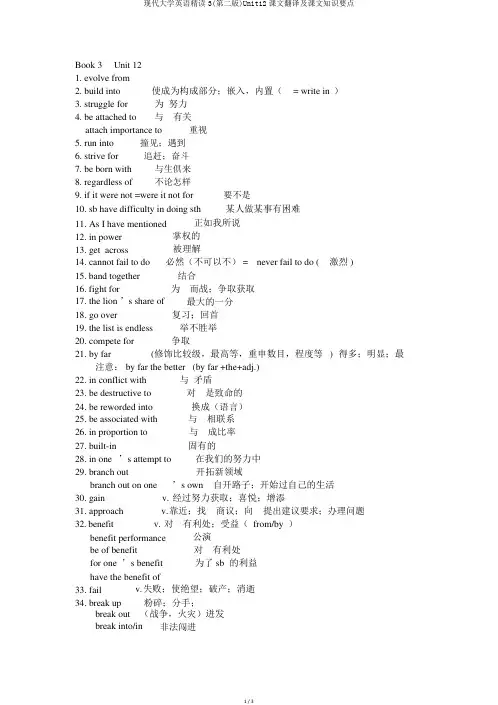
Book 3Unit 121. evolve from2. build into使成为构成部分;嵌入,内置(= write in)3. struggle for为 努力4. be attached to 与 有关attach importance to重视5. run into撞见;遇到6. strive for追赶;奋斗7. be born with与生俱来8. regardless of不论怎样9. if it were not =were it not for要不是10. sb have difficulty in doing sth 某人做某事有困难11. As I have mentioned 正如我所说12. in power 掌权的13. get across 被理解14. cannot fail to do 必然(不可以不) = never fail to do (激烈 )15. band together 结合16. fight for 为 而战;争取获取17. the lion’s share of 最大的一分18. go over 复习;回首19. the list is endless 举不胜举20. compete for 争取21. by far (修饰比较级,最高等,重申数目,程度等 ) 得多;明显;最注意: by far the better (by far +the+adj.)22. in conflict with 与 矛盾23. be destructive to 对 是致命的24. be reworded into 换成(语言)25. be associated with 与 相联系26. in proportion to 与 成比率27. built-in 固有的28. in one’s attempt to 在我们的努力中29. branch out 开拓新领域branch out on one’s own 自开路子;开始过自己的生活30. gain v. 经过努力获取;喜悦;增添31. approach v.靠近;找商议;向提出建议要求;办理问题32. benefit v. 对 有利处;受益( from/by)benefit performance 公演be of benefit 对 有利处for one’s benefit 为了 sb的利益have the benefit of33. fail v.失败;使绝望;破产;消逝34. break up 粉碎;分手;break out (战争,火灾)迸发break into/in非法闯进break through打破,打破,突围35.for the sake of safety 为了安全起见36.call on 呼吁;接见call out 出动,招集;高声叫唤37.stand on the side of 站在 一边;包庇;帮着stand behind做后盾38.get across 超出,渡过(一端到另一端)get through穿过(内部)slip through(从窄缝中)溜过,轻盈地穿过39. look around(round)环视40. in the hope that怀着 希望41. written on被写在 上42. strike out独立闯新路43.contradictory to 与 相矛盾44.share among=divide among 在 之间分派share with sb与 sb 一同分担Translation1.第二次世界大战此后,好多国家一个一个地博得了独立。
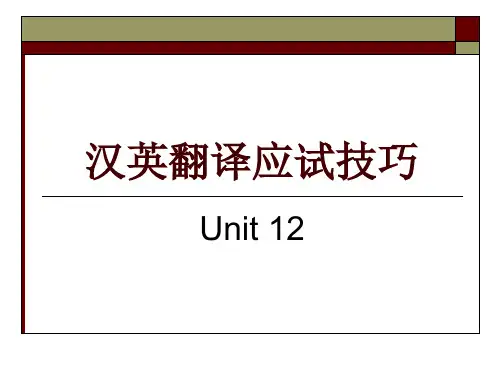
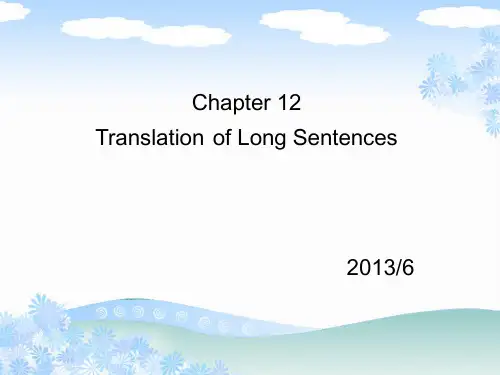

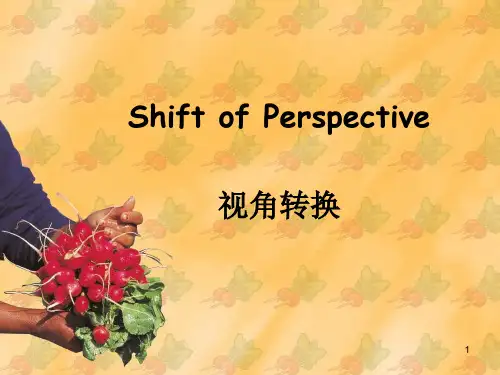

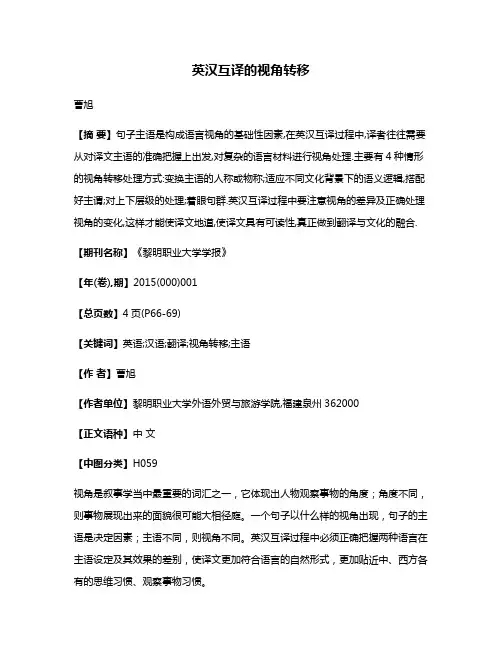
英汉互译的视角转移曹旭【摘要】句子主语是构成语言视角的基础性因素,在英汉互译过程中,译者往往需要从对译文主语的准确把握上出发,对复杂的语言材料进行视角处理.主要有4种情形的视角转移处理方式:变换主语的人称或物称;适应不同文化背景下的语义逻辑,搭配好主谓;对上下层级的处理;着眼句群.英汉互译过程中要注意视角的差异及正确处理视角的变化,这样才能使译文地道,使译文具有可读性,真正做到翻译与文化的融合.【期刊名称】《黎明职业大学学报》【年(卷),期】2015(000)001【总页数】4页(P66-69)【关键词】英语;汉语;翻译;视角转移;主语【作者】曹旭【作者单位】黎明职业大学外语外贸与旅游学院,福建泉州362000【正文语种】中文【中图分类】H059视角是叙事学当中最重要的词汇之一,它体现出人物观察事物的角度;角度不同,则事物展现出来的面貌很可能大相径庭。
一个句子以什么样的视角出现,句子的主语是决定因素;主语不同,则视角不同。
英汉互译过程中必须正确把握两种语言在主语设定及其效果的差别,使译文更加符合语言的自然形式,更加贴近中、西方各有的思维习惯、观察事物习惯。
英汉两种语言在句子主语或用人称或用物称的差异,导致英汉语句视角有所差别,这应当是英汉语句视角差异的最基本表现。
这也成为研究英汉语句视角差异须首要了解的问题。
虽然英语句子和汉语句子都大量存在人称做主语的现象,但是,英语句子除了以人称做主语外,还有大量的以物称做主语,即以动物、或物品、或事件作为句子的主语。
相比较而言,汉语更多使用着以人称做主语的句子,此外是大量的无主句——无主句中被省略的主语也多为人称主语。
英语以物称做主语,是由于西方文化历来注重自然科学和逻辑学,更注重客观。
可见,在英汉两种语言间翻译,需要在相应语言环境和文化环境中准确把握语句的主语。
连淑能就英语常以物称做主语这一现象,认为:“非人称表达法仍是英语常见的一种文风,尤其常见于书面语,如公文、新闻、科技论著以及散文、小说等文学作品。
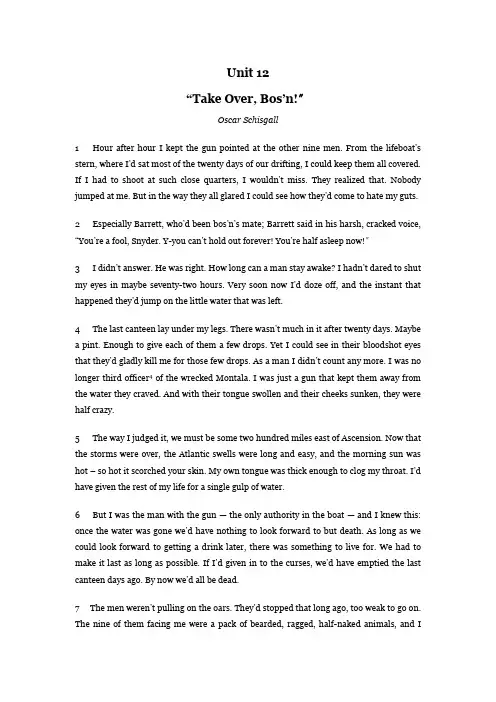
Unit 12“Take Over, Bos’n!〞Oscar Schisgall1 Hour after hour I kept the gun pointed at the other nine men. From the lifeboat’s stern, where I’d sat most of the twenty days of our drifting, I could keep them all covered. If I had to shoot at such close qu arters, I wouldn’t miss. They realized that. Nobody jumped at me. But in the way they all glared I could see how they’d come to hate my guts.2 Especially Barrett, who’d been bos’n’s mate; Barrett said in his harsh, cracked voice, “You’re a fool, Snyder. Y-you can’t hold out forever! You’re half asleep now!〞3 I didn’t answer. He was right. How long can a man stay awake? I hadn’t dared to shut my eyes in maybe seventy-two hours. Very soon now I’d doze off, and the instant that happened they’d jump on the li ttle water that was left.4 The last canteen lay under my legs. There wasn’t much in it after twenty days. Maybea pint. Enough to give each of them a few drops. Yet I could see in their bloodshot eyes that they’d gladly kill me for those few drops. As a man I didn’t count any more. I was no longer third officer4 of the wrecked Montala. I was just a gun that kept them away from the water they craved. And with their tongue swollen and their cheeks sunken, they were half crazy.5 The way I judged it, we must be some two hundred miles east of Ascension. Now that the storms were over, the Atlantic swells were long and easy, and the morning sun was hot –so hot it scorched your skin. My own tongue was thick enough to clog my throat. I’d have given the rest of my life for a single gulp of water.6 But I was the man with the gun — the only authority in the boat — and I knew this: once the water was gone we’d have nothing to look forward to but death. As long as we could look forward to getting a drink later, there was something to live for. We had to make it last as long as possible. If I’d given in to the curses, we’d have emptied the last canteen days ago. By now we’d all be dead.7 The men weren’t pulling on the oars. They’d stopped that long ago, too weak to go o n. The nine of them facing me were a pack of bearded, ragged, half-naked animals, and Iprobably looked as bad as the rest. Some sprawled over the gunwales, dozing. The rest watched me as Barrett did, ready to spring the instant I relaxed.8 When they were n’t looking at my face they looked at the canteen under my legs.9 Jeff Barrett was the nearest one. A constant threat. The bos’n’s mate was a heavy man, bald, with a scarred and brutal face. He’d been in a hundred fights, and they’d left their marks on him.10 Barrett had been able to sleep —in fact, he’d slept through most of the night – and I envied him that. His eyes wouldn’t close. They kept watching me, narrow and dangerous.11 Every now and then he taunted me in that hoarse, broken voice:12 “Why don’t you quit? You can’t hold out!〞13 “Tonight,〞I said. “We’ll ration the rest of the water tonight.〞14 “By tonight some of us’ll be dead! We want it now!〞15 “Tonight ,〞I said.16 Couldn’t he understand that if we waited until night the few drops wouldn’t be sweated out of us so fast? But Barrett was beyond all reasoning. His mind had already cracked with thirst. I saw him begin to rise, a calculating look in his eyes. I aimed the gun at his chest – and he sat down again.17 I’d grabbed my Luger on inst inct, twenty days ago, just before running for the lifeboat. Nothing else would have kept Barrett and the rest away from the water.18 These fools —couldn’t they see I wanted a drink as badly as any of them? But I was in command here — that was the difference. I was the man with the gun, the man who had to think. Each of the others could afford to think only of himself; I had to think of them all.19 Barrett’s eyes kept watching me, waiting. I hated him. I hated him all the more because he’d slept. He had that advantage now. He wouldn’t keel over.20 And long before noon I knew I couldn’t fight any more. My eyelids were too heavy to lift. As the boat rose and fell on the long swells, I could feel sleep creeping over me like paralysis. I bent my head. It fil led my brain like a cloud. I was going, going …21 Barrett stood over me, and I couldn’t even lift the gun. In a vague way I could guess what would happen. He’d grab the water first and take his drop. By that time the others would be screaming and tearing at him, and he’d have to yield the canteen. Well, there was nothing more I could do about it.22 I whispered, “Take over, bos’n.〞23 Then I fell face down in the bottom of the boat. I was asleep before I stopped moving…24 When a hand shook my shoulder, I could hardly raise my head. Jeff Barrett’s hoarse voice said, “Here! Take your share o’ the water!〞25 Somehow I propped myself up on my arms, dizzy and weak. I looked at the men, andI thought my eyes were going. Their figures were dim, shadowy; but then I realized it wasn’t because of my eyes. It was night. The sea was black; there were stars overhead, I’d slept the day away.26 So we were in our twenty-first night adrift —the night in which the tramp Croton finally picked us up – but now, as I turned my head to Barrett there was no sign of any ship. He knelt beside me, holding out the canteen, his other hand with gun steady on the men.27 I stared at the canteen as if it were a mirage. Hadn’t they finished that pint of water this morning? When I looked u p at Barrett’s ugly face, it was grim. He must have guessed my thoughts.28 “You said, ‘Take over, bos’n,’ didn’t you?〞he growled. “I’ve been holding off these apes all day.〞He hefted the Luger in his hand. “When you’re boss-man,〞he added, “in command and responsible for the rest — you —you sure get to see things different, don’t you?〞“水手长,接手吧!〞奥斯卡·希斯高尔1. 一小时又一小时,我用枪指着其他九个人。
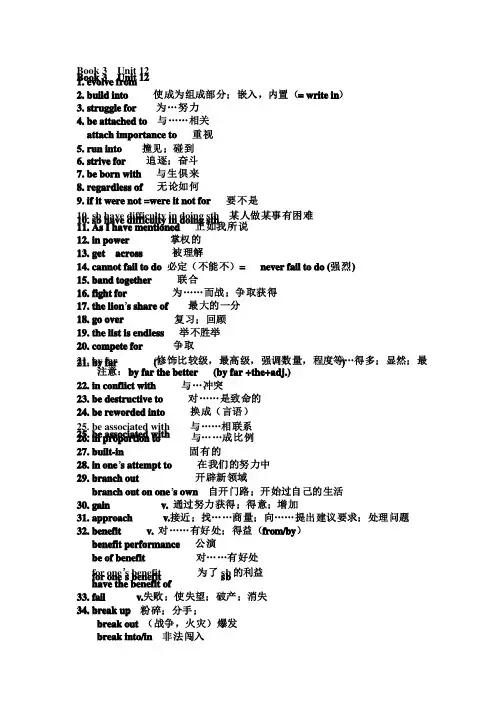
Book 3 Unit 121. evolve from2. build into 使成为组成部分;嵌入,内置(= write in)3. struggle for 为…努力4. be attached to 与……相关attach importance to 重视5. run into 撞见;碰到6. strive for 追逐;奋斗7. be born with 与生俱来8. regardless of 无论如何9. if it were not =were it not for 要不是10. sb have difficulty in doing sth 某人做某事有困难11. As I have mentioned 正如我所说12. in power 掌权的13. get across 被理解14. cannot fail to do 必定(不能不)= never fail to do (强烈)15. band together 联合16. fight for 为……而战;争取获得17. the lion’s share of 最大的一分18. go over 复习;回顾19. the list is endless 举不胜举20. compete for 争取21. by far (修饰比较级,最高级,强调数量,程度等)…得多;显然;最 注意:by far the better (by far +the+adj.)22. in conflict with 与…冲突23. be destructive to 对……是致命的24. be reworded into 换成(言语)25. be associated with 与……相联系26. in proportion to 与……成比例27. built-in 固有的28. in one’s attempt to 在我们的努力中29. branch out 开辟新领域branch out on one’s own 自开门路;开始过自己的生活30. gain v. 通过努力获得;得意;增加31. approach v.接近;找……商量;向……提出建议要求;处理问题32. benefit v. 对……有好处;得益(from/by)benefit performance 公演be of benefit 对……有好处for one’s benefit 为了sb的利益have the benefit of33. fail v.失败;使失望;破产;消失34. break up 粉碎;分手;break out (战争,火灾)爆发break into/in 非法闯入break through 突破,冲破,突围35. for the sake of safety 为了安全起见36. call on 号召;访问call out 出动,召集;大声叫喊37. stand on the side of 站在……一边;袒护;帮着 stand behind 做后援38. get across 越过,渡过(一端到另一端)get through 穿过 (内部)slip through (从窄缝中)溜过,轻快地穿过39. look around(round) 环顾40. in the hope that 怀着……希望41. written on 被写在……上42. strike out 独立闯新路43. contradictory to 与……相矛盾44. share among=divide among 在……之间分配share with sb 与sb 一起分担Translation 1. 第二次世界大战以后,很多国家一个一个地赢得了独立。
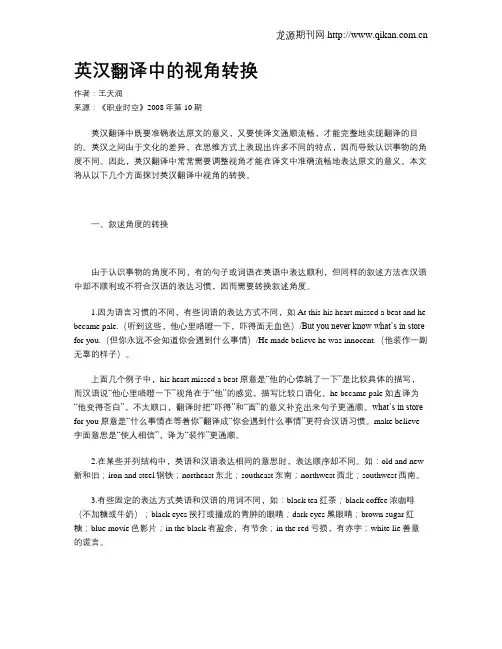
英汉翻译中的视角转换作者:王天润来源:《职业时空》2008年第10期英汉翻译中既要准确表达原文的意义,又要使译文通顺流畅,才能完整地实现翻译的目的。
英汉之间由于文化的差异,在思维方式上表现出许多不同的特点,因而导致认识事物的角度不同。
因此,英汉翻译中常常需要调整视角才能在译文中准确流畅地表达原文的意义。
本文将从以下几个方面探讨英汉翻译中视角的转换。
一、叙述角度的转换由于认识事物的角度不同,有的句子或词语在英语中表达顺利,但同样的叙述方法在汉语中却不顺利或不符合汉语的表达习惯,因而需要转换叙述角度。
1.因为语言习惯的不同,有些词语的表达方式不同,如At this his heart missed a beat and he became pale.(听到这些,他心里咯噔一下,吓得面无血色)/But you never know what’s in store for you.(但你永远不会知道你会遇到什么事情)/He made believe he was innocent.(他装作一副无辜的样子)。
上面几个例子中,his heart missed a beat 原意是“他的心停跳了一下”是比较具体的描写,而汉语说“他心里咯噔一下”视角在于“他”的感觉,描写比较口语化。
he became pale如直译为“他变得苍白”,不太顺口,翻译时把“吓得”和“面”的意义补充出来句子更通顺。
what’s in store for you原意是“什么事情在等着你”翻译成“你会遇到什么事情”更符合汉语习惯。
make believe 字面意思是“使人相信”,译为“装作”更通顺。
2.在某些并列结构中,英语和汉语表达相同的意思时,表达顺序却不同。
如:old and new 新和旧;iron and steel钢铁;northeast东北;southeast东南;northwest西北;southwest西南。
3.有些固定的表达方式英语和汉语的用词不同,如:black tea红茶;black coffee浓咖啡(不加糖或牛奶);black eyes挨打或撞成的青肿的眼睛;dark eyes黑眼睛;brown sugar红糖;blue movie色影片;in the black有盈余,有节余;in the red亏损,有赤字;white lie善意的谎言。
onwards and upwards在一个富裕的世界,关于进步的观念则变得贫困。
现状引起的自满和经历带来的痛苦都使得进步的视野越变越狭窄。
取决于你爱看哪种立场的报纸,流行的看法是:尽管科技和GDP发展了,道德与社会却停滞不前,甚至可说是,正在向颓废和野蛮沉沦。
在当今政治的左翼,“进步”这两个字必定带有讽刺性的引号;而对于政治的右翼,“进步人士”也是一个被滥用的术语。
情况也并非一直都是这样糟糕。
长久以来,是求今生圆满,还是求来世完美,一直是不可得兼的难题。
18世纪启蒙运动和19世纪中的乐观主义者相信在全人类总有一天能够在地球上过上幸福和有价值的生活。
正如马达可笔下的亚当,他们对如何改进世界充满了各种想法。
一些人认为上帝应该带来一个新的耶路撒冷,另一些人则想从历史或进化论里查找答案。
有些人认为人民在放任的状态下会自求改善,另一些人则认为只有施加压力人民才会去争取自由;有些人寄希望于民族国家,另一些人则希望民族国家的终结;一些人想要一种完美的语言,另一些人则看重全民教育;一些人将希望寄托于科学,另一些则寄托于商业;有人忠于英明的立法,有人则倾向无政府主义。
智慧的人生伴随伟大的思想倾泻而出。
对于大多数人,问题不是进步是否发生,而是怎如何发生。
关于进步的观念形成了一个社会的大背景。
推到极端,如果一点进步都做不到,利己就必损人。
如果人类的行为不可改造,(那么人同猿人并无差别),社会政策就永远只能是为了把这个猿人关在笼子里。
原则上讲,社会必须能够朝着完美典范前进,诸如自由和平等,否则那些典范就是伪善和自欺欺人。
因此,如果人们对进步失去信念,问题就大了。
如何拾回失去的信念就很值得思考。
行文至此,你们中很多人会忍不住反对。
难道我们周围不都是进步的明证吗?这就是“情况一直变得越来越好”这本书提出的论点。
这本书的作者是已故的Julian Simon and Stephen Moore,当时被聘于华盛顿自由主义者智库卡托研究所。
补充材料:英汉、汉英翻译技巧:视角转换(Shift of Perspective)E-C.1. The University of San Francisco is located near the Golden Gate Park.(语态的转换)2. Her parents are both in their seventies.(表达方式的转换)3. If children are so well able to learn their mother tongue, it is precisely because they plunge themselves into the sea of language instead of reading a few textbooks only. (条件状语转换成结果状语)4. You can mass-produce … incredible quantities of facts and figures. You cannot mass-produce knowledge, which is created by individual minds, drawing on individual experience, separating the significant from the irrelevant.(定语从句转换成原因状语从句)5. "Coming!" Away she skimmed over the lawn, up the path, up the steps, across the verandah, and into the porch.(介词转换成动词)6. Highway and air traffic came to a standstill in most of Eastern Washington.(名词转换成动词)7. I believe equally that it is in the interests of the world as a whole that Europe should increasingly unite and speak with a common voice.(词序调整)8. Little did I then know the meaning of war and what it was in reality.(词序调整)9. It is a good workman that never blunders.(反说正译)10. Keep off the lawn!11.That fellow is far from being honest.12.Obviously enough, she thinks otherwise.(正说反译)13 I was like that ship before education began, only I was without compass or sounding-line, and had no way of knowing how near the harbor was.汉译:我在开始受教育之前,就像这样一条船,只是没有罗盘,没有测深绳,也无法知道离海港有多远。
英汉翻译中视角的转换类型及处理方式[ 08-11-09 10:56:00 ] 作者:彭雅琼编辑:studa0714【摘要】受制于英汉双语在结构及习惯表达上的差异性,在英汉翻译中运用视角转换的方法,可以使译文通顺流畅,符合译语读者的语言习惯。
本文主要分析了正说反译、形象转换、虚实转换以及为了达到修辞目的的转换办法,说明视角转换的翻译方法对于增强译文的可读性有很大作用。
【关键词】英汉翻译;视角转换作为一种双语艺术,翻译是从一种语言到另一种语言的转换。
二十世纪六十年代,奈达提出的形式对应翻译基本上以原语为中心,力求使接受语中的信息尽可能地接近原语中的各种成分,最大限度的显示原文中的形式和内容,努力再现多种形式因素。
然而,翻译并不是从一种语言到另一种语言词和词的单纯转换。
由于任何一种语言都局限于自己特定的文化背景中,它们各自在其渊远流长的历史中形成了独有的表达方式。
同时,使用不同语言的读者也形成了对自己所属语言系统独特的表达方式的习惯性。
因此,相同的思维内容可以用不同的语言负载,这并不意味着原语和译语间在形式和语境上有完全相同的意义。
纽马克提出,在译入语允许的范围内,尽可能地使译文从语义和句法上接近原文,将原文确切的上下文意义翻译出来,进行“语义翻译”。
各语言的表现形式上存在纷繁复杂的差异性,这就要求译者在不涉及特殊文化背景因素的情况下,用译语意义代替原语意义,“重组原语信息的表现形式,从与原语不同甚或相反的角度来传达同样的信息”(柯平,1995),这就是所谓的视角转换。
这种翻译方法使得译文更符合译语习惯,同时也更好地传达原作信息。
一、正反转换(Negation)正反转换是最主要的视角转换类型之一,意即对那些正面译不通顺的英语表达从反面来译,从反面译不通顺的从正面来译,出于对译语优势、可接受性和可读性方面的考虑,而舍弃形式方面的意义对等,保留内容方面的意义对等。
①He manifested a strong dislike for his father’s business.他对他父亲的行业表示强烈的厌恶情绪。
Unit 12 翻译中视角的转移
课时:
2H
教学目的要求:
认识并初步理解汉英翻译技巧中的正说反说技巧,并在实践中加以运用。
教学重点:
汉英翻译中的正说技巧,并能够根据提示灵活运用该技巧进行翻译,重点掌握表示正说常用的词汇。
教学难点:
如何使译文准确、地道。
教学内容:
◆Things could be expressed either in a positive way or in a negative way.
◆One of the biggest differences between Chinese and English.
⏹Warm-up practice:
1.今天的中东还很不安宁。
The Middle East today is far from peace. (反说正译)
2.他的解释不能让人满意。
His explanation is far from satisfactory. (反说正译)
试比较:His explanation is really not satisfactory.
3.黄鼠狼给鸡拜年,不安好心。
The weasel pays a courtesy to the hen with evil intent. (反说正译)
试比较:The weasel goes to pay respects to the hen not with the best of intentions.
4.我认为他的回答不对。
I don’t think his answer is correct. (正说反译法)/(反说正译) (注意句子结构
前后的对比)
5.天都这么晚了,我看她不会来啦。
It is so late; I don’t think she will come. (正说反译法)/ (反说正译) (注意前
后结构的对比)
⏹正说法(用英语形式上肯定的词表示中文意义上否定的意思)
表否定语气的动词fail, miss, lack, ignore, refuse, withhold, refrain from, neglect, deny, overlook, exclude etc.
1.他不愿意接受那笔款子。
He refused to take the money.
2.他去机场接朋友,可是在人群中未见到他。
He went to the airport to pick his friend up, but he missed him in the crowd.
3.他看了看桌上的点心,摇了摇头,一点也不吃。
He ran his eyes over the refreshments on the table but shook his head and refused to touch anything.
表否定语气的名词:absence, failure, refusal, ignorance, neglect, exclusion etc.
1. 司机开车时,千万不能心不在焉。
A d river’s absence of mind is absolutely forbidden.
2. 我们完全不知道他的计划。
We are in complete ignorance of his plan.
3. 他未能旅行诺言,我们大家都很失望。
His failure to carry out his promise has disappointed every one of us.
形容词或形容词短语:few, little, free from, far from, safe from, short of etc.
1. 他的作文中几乎没有语法错误。
There are few grammatical mistakes in his composition.
2. 那家伙极不老实。
That fellow is far from being honest.
3. 所谓中国文明者,其实不过是安排给阔人享用的人肉的筵宴。
所谓中
国者,其实不过是安排这人肉的筵宴的厨房。
(鲁迅《灯下漫笔》)
Our vaunted Chinese civilization is only a feast of human flesh prepared for the rich and mighty. And China is only the kitchen where these feasts are prepared.
(杨宪益、戴乃迭译)
4. 欲速则不达。
More haste, less speed.
副词或副词短语:little, otherwise, too…to.. etc.
1. 显然他有不同的想法。
He evidently thinks otherwise.
2. 他兴奋得说不出话来了。
He was too excited to speak.
连词:unless, before, until, (rather)than, or etc.
1.机不可失,时不再来。
A golden opportunity knocks but once. (An opportunity is not likely to repeat to
repeat itself.)
2.他宁愿饿死,也不愿行窃。
He will die of hunger before he steals. He would rather die of hunger / starve than steal.
介词和介词短语:without, above, except, beyond, instead of, in place of, out of etc.
1.这非我能力所及。
This is beyond my reach.
2.要不是你帮忙,我是无法按时完成那任务的。
Without your help, I could not have fulfilled the task in time.
含有半否定语气的词:seldom, hardly, barely, scarcely, rarely
1.工作没有经验,出点差错,在所难免。
Slips are scarcely avoidable when you are new to your work
2.他太自私了,几乎谁也不喜欢他。
Hardly anybody likes him, because he is too self-centred.
英语惯用法
1.当心,油漆未干!
Watch out! Wet paint!
2.在未接到通知以前,切勿前来上课。
Before you receive any notice, be sure not to come for attendance.
3.在支票尚未核对以前出纳不得支付现金。
Before the check has been verified, the cashier is not to cash the money.
反说法(用英语形式上否定的英语词表达汉语肯定的意义)
1.他这学期全勤。
He has never missed a class this semester.
2.开卷有益。
One cannot read a book without leaning something.
3.我对你感激万分。
I couldn’t thank you enough.
4.直到喷气式发动机发明以后,飞机才能以超音速的速度飞行。
Not until the invention of the jet engine could airplanes travel at supersonic speeds.
5.智者千虑,必有一失。
Even the wise are not always free from errors.
Exercise:
Please use the skill to translate the following the sentences into English.
1. 你为何知情不报?
2. 这尊雕像历经大地震后毫发未损,仍然矗立。
3. 女儿未出嫁,是颗无价珠宝。
4. 谅你不敢再这么干。
5. 你借钱给那个无赖,不啻把钱丢海里。
6. 自然界中的作用力,必定要牵涉到两个或两个以上的物体。
7. 他一直渴望成功。
8. 男人有泪不轻弹,皆因未到伤心处嘛。